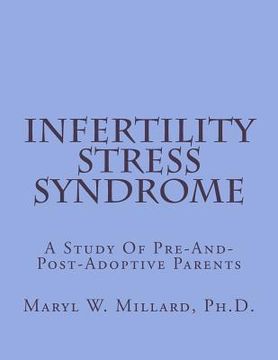Compartir
Infertility Stress Syndrome: Trauma Exacerbated by Gender Differences (en Inglés)
Maryl W. Millard Ph. D.
(Autor)
·
Createspace Independent Publishing Platform
· Tapa Blanda
Infertility Stress Syndrome: Trauma Exacerbated by Gender Differences (en Inglés) - Millard Ph. D., Maryl W.
12,68 €
14,09 €
Ahorras: 1,41 €
Elige la lista en la que quieres agregar tu producto o crea una nueva lista
✓ Producto agregado correctamente a la lista de deseos.
Ir a Mis Listas
Origen: Estados Unidos
(Costos de importación incluídos en el precio)
Se enviará desde nuestra bodega entre el
Martes 23 de Julio y el
Martes 06 de Agosto.
Lo recibirás en cualquier lugar de España entre 1 y 5 días hábiles luego del envío.
Reseña del libro "Infertility Stress Syndrome: Trauma Exacerbated by Gender Differences (en Inglés)"
Infertility Stress Syndrome is a formal statistical study of Post Traumatic Stress Disorder experienced by pre and post adoptive parents. This population's PTSD symptoms were significantly in excess of trauma norms for rape and loss of significant other. There were highly significant gender differences in PTSD scores due to different gender-specific styles of perceiving and coping with trauma and loss. This publication provides researchers and adoption counselors data on the many complex environmental stimuli that trigger pain and avoidant behavior for infertile adoptive parents. The questionnaires used in the study are included in the publication and can be used to assess clients' symptoms and experiences. When couples are assessed with these measures they are often relieved to see they aren't alone or atypical in their perceptions. They often see how stressful events were made more stressful because women's responses are typically very different than men's...women talk and emote more; men often shut down when overwhelmed by their spouses' emotions. The pain these couples experienced was found to decrease over time, but was shown to be restimulated by experiences that triggered memories of prior infertility or adoption losses. Adoption counselors trained in these dynamics have postulated that memories of this pain cause most adoptive parents to react with anxious and often phobic behavior toward birthparents whenever adoptees or birthparents state they feel they need to establish contact with each other. This is less likely to happen when there has been adequate preadoption counseling that provided the birthparents and adoptive parents an opportunity to work through their concerns and fears with a skilled counselor/mediator, so they are able to establish a more comfortable relationship. If this process has been incomplete or if the parties kept feelings hidden out of fear the adoption wouldn't happen, then the post adoptive relationship between birthparents and adoptive parents has a higher probability of failing once the adoption has been legalized. Adoptees and birthparents often choose to sacrifice the value of a relationship with each other because they fear the judgment or disapproval of the adoptive parents, or because they want to protect the adoptive parents from anxiety or pain they may feel about the adoptee and the birthparent having an open relationship. Most adoptees report they have a need for the sense of genetic continuity that contact with genetic ancestors can provide. Most birthparents report they want the opportunity to provide medical and ancestral information directly to the adoptee, and want reassurance the adoptee is alive and well. Biologists agree that the most powerful human instinct is personal survival, the second most powerful instinct is to reproduce, and the third tier instinct is to nurture one's offspring in order to maintain their survival. Birthmothers feel this instinctual drive as powerfully as any other mother, yet to have no reassuring contact with that child often causes a chronic grief syndrome that damages healthy personal development. Phobic behavior toward birthparents also telegraphs a message of classic prejudice and discrimination, for the birthparents know they are not being judged by the content of their actual character, but by the irrational perception that their presence will threaten the bond that exists between the adoptee and the adoptive parent. Adoptive parents strongly desire to have "normal" developmental stages of parenthood, including the role of grandparent. Although they state in counseling that they would be heartbroken if they were denied the right to have a relationship with their grandchildren. The adoptive parents rationale is "contact would confuse my child/grandchild. I want to protect them" The adoptee/grandchild gets branded 'likely to be confused', instead of the adoptive parent owning his/her confusion. More communication needed here.
- 0% (0)
- 0% (0)
- 0% (0)
- 0% (0)
- 0% (0)
Todos los libros de nuestro catálogo son Originales.
El libro está escrito en Inglés.
La encuadernación de esta edición es Tapa Blanda.
✓ Producto agregado correctamente al carro, Ir a Pagar.

